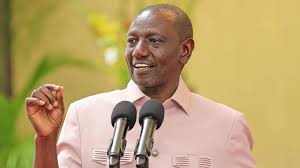The recent suspension of U.S. foreign aid, particularly through USAID and PEPFAR, has sent ripples across Kenya. While much attention has been on the health sector, we, the backbone of Kenya’s transport industry, must also brace ourselves for the impact. As long-distance drivers and conductors, we keep this nation moving—delivering goods, transporting passengers, and connecting communities. But this funding freeze threatens not only our health but also our livelihoods. Here’s how it affects us and what we, as LoDDCA, can do about it.
1. Healthcare Access for Drivers and Families
For years, PEPFAR has been a lifeline for many of us, providing free or affordable HIV/AIDS and TB treatment, STI screening, and preventive care. Roadside clinics and truck-stop health centers, often funded by PEPFAR, have been a safe haven for drivers who spend days or weeks on the road.
What this means for us:
- Fewer health services: Clinics along major highways may close or reduce services, leaving us with nowhere to turn for routine checkups or emergency care.
- Higher costs: Many of us will now have to dig deeper into our pockets to pay for services that were once free or subsidized.
- Longer waits: With fewer resources, health facilities may operate with skeleton staff, leading to delays in treatment and longer wait times.
2. Disruptions in Transport Logistics and Supply Chains
USAID has been a key player in supporting the transport of medical supplies, vaccines, and other essential goods across Kenya. Many of our members are directly involved in these logistics, ensuring that life-saving supplies reach hospitals, clinics, and communities on time.
How this affects us:
- Fewer jobs: Truckers involved in medical supply distribution may see a drop in contracts as funding dries up.
- Delayed payments: Government projects relying on USAID funding may face delays, meaning late payments for drivers and transporters.
- Cross-border challenges: Regional supply chains may be disrupted, affecting drivers who work on routes connecting Kenya to neighboring countries.
3. Economic Slowdown Hits Passenger Transport
The freeze in aid has already led to job losses and unpaid leave for thousands of healthcare and NGO workers. This directly impacts the demand for long-distance passenger transport, as fewer people will be traveling for work or other purposes.
What this means for us:
- Fewer passengers: Routes that rely on USAID-funded programs or NGO workers may see a sharp decline in passenger numbers.
- Fare hikes: To stay afloat, bus and matatu operators may increase fares, which could further reduce demand.
- Financial strain: With fewer trips and passengers, many of us will struggle to make ends meet, especially those with families to support.

4. Roadside Wellness Clinics and Support Programs at Risk
USAID-funded roadside wellness clinics and health awareness programs have been a critical support system for long-distance drivers. These programs offer free counseling, mental health support, family planning services, and preventive care—services that many of us rely on to stay healthy and productive.
Risks due to the funding freeze:
- Closure of clinics: Some roadside health facilities along major trucking routes may shut down entirely.
- Mental health challenges: With reduced access to counseling and support, drivers may face increased stress, depression, and substance abuse.
- Long-term health risks: Preventive services may become unavailable, leading to more severe health issues down the line.
What Can LoDDCA Do?
As the LoDDCA we cannot sit back and watch as these challenges unfold. We must take action to protect our health, jobs, and future. Here’s what we can do:
- Advocate for alternative funding: We will engage with the Ministry of Health, County Governments, private partners, and other stakeholders to secure funding for critical health services and transport-related programs.
- Acquire Health Insurance Cover: We encourage all drivers and conductors to enroll in the Medical Scheme including Dere Cover and Dere Afya or even SHA/SHIF to ensure access to affordable healthcare.
- Partner with local clinics: We will negotiate with local hospitals and clinics to provide discounted medical services for our members.
- Push for policy changes: We will advocate for sustainable local funding for roadside wellness programs and other initiatives that support the transport workforce.
- Raise Awareness: We will actively inform our members about the impact of the funding freeze and empower them with knowledge on alternative healthcare options.
A Call to Action
Fellow drivers and conductors, the USAID and PEPFAR funding freeze is a challenge, but it is not insurmountable. As LoDDCA members, we must stand together, support one another, and push for solutions that work for us.
We call on the Kenyan government, county leaders, and private sector partners to step up and ensure that the transport workforce is not left behind. Let us work together to find sustainable solutions that protect our health, livelihoods, and future.
LoDDCA remains committed to fighting for the rights and well-being of long-distance drivers and conductors. Together, we can navigate this crisis and emerge stronger.
Stay safe, stay healthy, and keep moving forward!
LoDDCA—Your Voice, Your Strength, Your Future.



